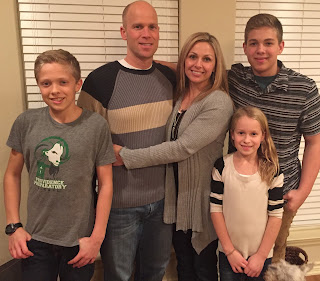By Rodger Dean Duncan
 |
These are the fall colors we get at our home in Missouri.
Not so much in Central Texas. We love both places.
|
In Central Texas, there don't seem to be seasons. There are temporary "spells," and they don't necessarily coincide with our expectations for a particular time of year.
For example, last Christmas Eve here in Waco it was warm enough to require air conditioning to cool our apartment.
We especially miss autumn. At home in Missouri, the autumn colors have exploded in their full glory. In Waco, only a few trees are turning orange even in mid November.
Because we were married in October, we have many fond memories of autumn. We've observed our anniversary in beautiful overseas places like Prague and Florence, and we've celebrated in less exotic venues like a hospital cafeteria (our first grandson was born 13 years ago on our 35th anniversary).
One year Rean and I decided to take a spontaneous October trip to honor our
anniversary. We love the
magnificent colors of autumn in New England. So we flew
to New York, rented a car, and headed north through Connecticut and
Massachusetts.
As we
entered a little village in southern Massachusetts we noticed a small sign at
the side of the road. It read simply: “Please drive carefully. We have no
children to spare.”
At first,
we chuckled. What a friendly safety reminder, we thought. Then it occurred to
us that – though likely inadvertent – that message was pure gospel doctrine: Our
Heavenly Father has no children to spare.
He wants us all to return home safely
to him.
Our Father
and our Savior have given us a glorious Plan of Salvation. It’s a
simple Plan. Nothing complicated. No tricks or convoluted requirements. The purpose
of the Plan is to enable us – Heavenly Father’s children – to make wise choices
that help us navigate through the crooks and turns of mortality.
Today, our
GPS devices are on the dashboard of our car and on the screens of our
smartphones. But the
very first GPS we used years ago seemed to have a personality all its own. When we made a
wrong turn, it would “talk” to us in a tone that seemed a bit impatient or
even condescending. It would
say, with apparently exasperation, “recalculating.” If we made another wrong
turn, it would again say "recalculating." Eventually, we always found our way to our safe destination.
With the
Holy Ghost, each of us can have the ultimate GPS. The Holy Ghost has his own way of
urging us to “recalculate” our position and direction. But his
guidance is never impatient, never condescending.
The church
organization itself is the ideal environment for our spiritual growth and
development. The Savior’s
restored church provides the heaven-ordained support for the human family. And because
it is the Savior’s restored church, it’s organized exactly as originally
established by the Savior himself.
This makes for interesting conversation with people from other faith communities. Not long ago we hosted a dinner party for a Baptist minister and his wife. Our friend expressed interest in how The Church of Jesus Christ of Latter-day Saints "works." He was especially intrigued that the Church has no professional clergy. He struggled to understand how an LDS bishop, for example, would devote 30 or more hours a week to his ecclesiastical duties and receive zero monetary compensation. I explained that we don't campaign for position. We don’t submit our resumés for selection by some hiring
committee. As
covenant-keepers, we simply make ourselves available to serve in whatever
capacities the Lord invites us. We do it gladly because it's all about covenants, not about jobs. As leaders
in the Church, we are deputized to help develop the faith and spiritual
capacity of others among Heavenly Father’s precious children. That
stewardship, I explained, implies both an awe-inspiring trust from the Lord and a humbling
partnership with the Lord.
And we do our best to lead and serve with special care. Why? Because our Father has no children to spare.
My Favorite iPhone Playlist
Sometimes when I'm exercising, taking a 20-minute power nap, or even when driving, I like to play music stored on my iPhone. My go-to playlist is a series of hymns.
At the top of the list is "I Love the Lord." My favorite version is the BYU Mens Chorus from the April 2007 Priesthood Session of General Conference. This wonderful rendition, sung to the tune of "Be Still My Soul," is an arrangement by Ronald Staheli with John Tanner's paraphrase of 2 Nephi 4 as lyrics.
Click here to see and hear the 2007 performance. Then follow the wonderful lyrics, below.
I love the Lord, in Him my soul delights.
Upon His word, I ponder day and night.
He’s heard my cry, brought visions to my sleep,
And kept me safe o’er deserts and the deep.
He’s filled my heart with His consuming love,
And borne me high on wings of His great dove.
Yet oft I groan, "O wretched man am I"
My flesh is weak and I’m encompassed by
A world of sin, which holds me in it’s thrall,
If I give in and to temptations fall.
Then strength grows slack, I waste in sorrow’s vale;
My peace destroyed, my enemies prevail.
The Lord my God, who is my rock and stay
To keep me strict upon His straight, plain way.
Oh let me shake at the first sight of sin
And thus escape my foes without and in.
Awake, my soul! No longer droop in sin.
Rejoice, my heart! And let me praise again.
I love the Lord, in Him my soul delights.
















